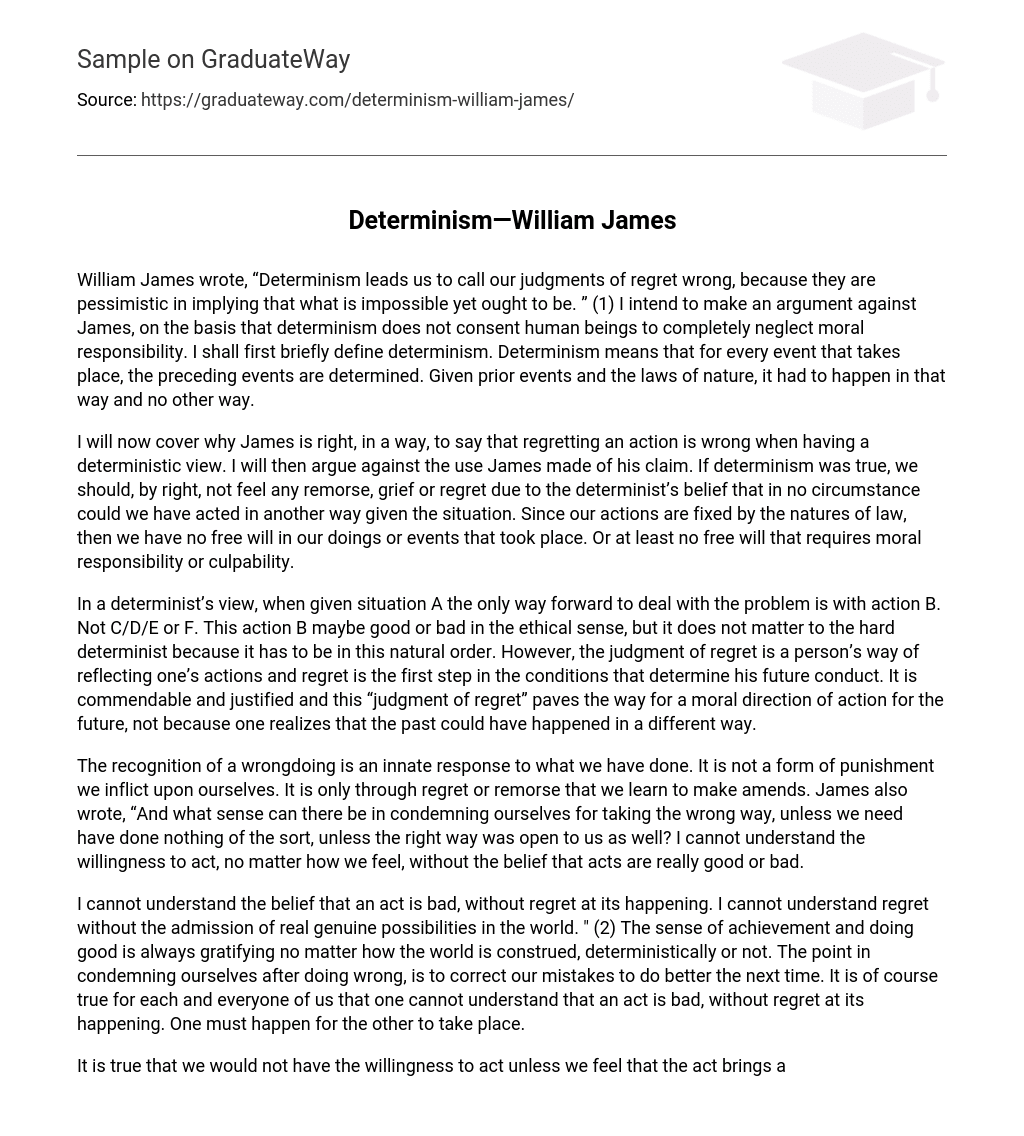William James (1) argued that determinism leads us to view our judgments of regret as wrong because they imply that something impossible should still occur. However, I disagree and will present an argument against James, asserting that determinism does not absolve humans of moral responsibility. To begin, I will provide a brief explanation of determinism. Determinism posits that every event is predetermined by preceding events and the laws of nature. Therefore, each event can only happen in a specific manner dictated by these factors and no other way.
In this text, I will discuss why James is partially correct in stating that regretting an action is invalid in a deterministic perspective. However, I will also argue against the way James used his claim. If determinism is true, we should not feel any remorse, sorrow, or regret because determinists believe that we could not have acted differently under any circumstance. Our actions are predetermined by natural laws, leaving no room for free will in our choices or events. At least not a free will that involves moral responsibility or blame.
In the perspective of determinism, when presented with situation A, the only viable course of action is B, excluding options C, D, E, or F. Whether action B is morally good or bad is irrelevant to the hard determinist because it must adhere to this predetermined sequence. Nevertheless, the feeling of regret allows individuals to reflect on their actions and serves as the initial step in shaping their future behavior. This judgment of regret is praiseworthy and justifiable, paving the way for moral guidance in future actions, not due to an awareness that the past could have unfolded differently.
The recognition of wrongdoing is an inherent response to our actions. It is not a self-imposed punishment but rather a means to learn from our mistakes through regret or remorse. James also stated, “And what is the point of condemning ourselves for choosing the wrong path unless we had the option to choose the right path as well? I cannot comprehend taking action, regardless of our emotions, without the belief that actions hold moral value.”
The idea that an action can be considered negative without any sense of remorse is impossible to understand. Remorse cannot be comprehended unless we acknowledge the existence of genuine possibilities in the world. The satisfaction that comes from achieving and doing good remains constant, regardless of how we perceive the world, whether it is deterministic or not. By condemning ourselves after committing wrongdoing, we are able to correct our mistakes and strive for improvement in the future. It holds true for every person that one cannot identify an action as bad without feeling regret for it. The presence of one necessitates the occurrence of the other.
The willingness to act is contingent upon the perceived result being positive or negative. Regret stems from genuine possibilities, which primarily involve future events rather than past incidents. Reversing this order would render the notion of possibility meaningless. It is important to highlight that moral responsibility and determinism can coexist within the determinist perspective. In this outlook, individuals should not be held accountable for their actions as events unfold as they are meant to.
The determinist does not anticipate being held responsible for a moral deed or being criticized for a wrongdoing. One might view the determinist as either selfless or selfish, as their actions are driven by their own interests rather than seeking approval or avoiding blame. In contrast to non-hard determinists who desire validation from others, the determinist carries out the correct action solely for their own advantage. They do not contemplate whether their actions deserve praise or blame. Hence, it can be inferred that the determinist’s actions possess greater integrity compared to those of non-hard determinists.
To sum up, determinism questions the idea that non-determinists only focus on their own interests and disregard moral principles necessary for maintaining societal order. I have explained why determinists reject these criticisms. However, I have also argued that the deterministic viewpoint can provide a superior form of morality. This entails performing acts of kindness motivated by moral obligation rather than seeking public approval. (1) William James, The Dilemma of Determinism (2) William James, The Dilemma of Determinism





